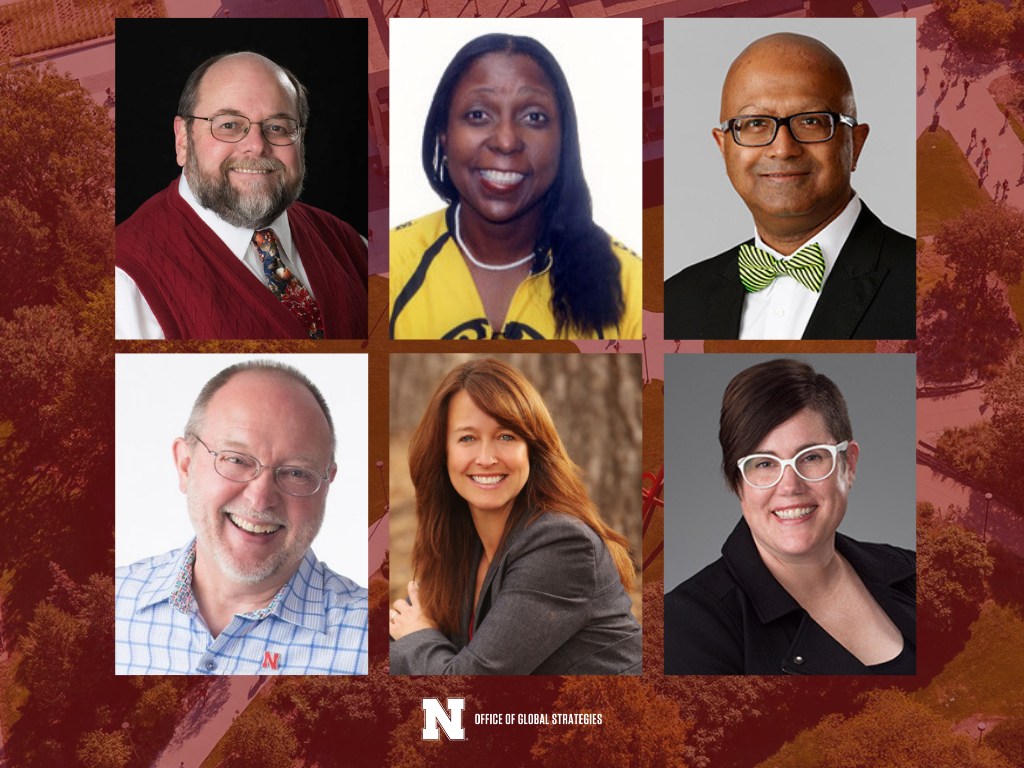
The Office of Global Strategies has selected six faculty members from the University of Nebraska-Lincoln (UNL) to receive a Global Virtual Classrooms grant. Funds will support faculty committed to incorporating innovative technologies in existing undergraduate or graduate courses through collaborative, online international learning (COIL) sessions. The grant is an expansion of the 2017-18 UNL Global Virtual Project.
As inaugural awardees, the following faculty will collaborate with peers at participating institutions to create virtual exchanges in existing courses: Dr. Charles Braithwaite (Communications Studies); Dr. Lory Dance (Sociology); Professor Dipra Jha (Hospitality, Restaurant and Tourism Management); Professor Gary Kebbel (Journalism); Dr. Patrice McMahon (Political Science); and Dr. Kara Viesca (Teaching, Learning and Teacher Education).
Launched in spring 2018, the UNL Global Virtual Project included six virtual exchange courses across three colleges with institutional partners in the United Arab Emirates, Oman and Jordan as part of the Stevens Initiative. The Stevens Initiative is sponsored by the U.S. Department of State and administered by the Aspen Institute, with additional funding provided by the Bezos Family Foundation and the governments of Morocco and the United Arab Emirates. The Initiative is an international effort to build global competence and career readiness for young people in the United States and the Middle East and North Africa while growing and enhancing the field of virtual exchange: online, international, and collaborative learning. UNL students engaged in cross-cultural learning experiences and peer-to-peer engagement through synchronous virtual exchange sessions and asynchronous activities. Examples of such activities included cultural presentations, group discussions and collaborative group work.
“We were elated to be a grant recipient of the prestigious Stevens Initiative as it was an inherent part of our greater vision to incorporate virtual exchanges in UNL’s curriculum with partners from across the world,” said Associate Vice Chancellor for International Engagement and Global Strategies Sonia Feigenbaum. “The Global Virtual Project laid the groundwork for engagement in the Middle East and North Africa, and we in the Office of Global Strategies are excited to now expand efforts globally with Global Virtual Classrooms grant.”
The Global Virtual Classrooms grant aims to expand on the success of the Stevens Initiative and enlarge the scope of the UNL project. While the Stevens Initiative focuses on building global competency and career readiness for young people in the United States and the Middle East and North Africa regions, the Global Virtual Classrooms grant supports virtual exchanges in all regions of the world.
“We are scaling up and within five years, we hope to have a robust cohort of key UNL courses with a virtual exchange component,” added Feigenbaum.
From one virtual exchange course offered in spring 2018, to five offered during fall 2018, the UNL Global Virtual Project has already reached an estimated 300 students. With the new grant, UNL aims to engage an additional 400 students across the world and diverse academic disciplines.
Grantees for this fall’s grant competition will expand global perspectives in the classroom with the following proposed courses:
- Cultural Encounters and the Great Plains: Taught as an online-only course for several years, this course examines the encounters experienced by new migrants to the Plains area. With the help of the Global Virtual Classrooms grant, students will discuss immigrants’ experience and learn how to explain culturally specific aspects of their homeland. Taught by Dr. Braithwaite in partnership with Shimane University in Matsue, Japan.
- Intersectionality: Race, Class, Gender, and Sexuality: This course focuses upon inequities and privileges that adhere to interlocking social identities. With virtual exchange sessions, students will explore the dynamics of social identities from and within different national contexts. Taught by Dr. Dance in partnership with Lund University in Lund, Sweden.
- Introduction to the Lodging Industry: This course explores the history and fundamentals of the lodging industry. COIL sessions will enable students to learn about hospitality in various areas of the world, as well as increase competency in a global industry. Taught by Professor Jha in partnership with The Emirates Academy of Hospitality Management in Dubai, United Arab Emirates; Oman Tourism College in Muscat, Oman; Breda University of Applied Sciences in Breda, Netherlands; and Bournemouth University in Bournemouth, United Kingdom.
- Global News in the Age of Social Media: This course examines the news flows from organizations to individuals and theories of press related to regime structures. Virtual exchange teaches students to communicate with people from difference countries and gain first-hand knowledge of news flows. Taught by Professor Kebbel in partnership with the University of Nizwa in Muscat, Oman.
- Saving the World: Technology, Actors, and Solutions for 21st Century Problems: A University Honors Program course, “Saving the World” offers students an overview of 21st century major issues and institutions of global governance. In addition to discussions with peers about global challenges, students will consider solutions for such problems. Taught by Dr. McMahon in partnership with the Jagiellonian University in Krakow, Poland.
- Intercultural Perspectives on Theory in Education Research: This special topics, graduate-level course focuses on qualitative and quantitative methods in education research. Combining synchronous and asynchronous exchange activities, participants will examine theoretical frameworks from an intercultural perspective and explore future international collaborations. Taught by Dr. Viesca and Dr. Thomas in partnership with the University of Turku in Turku, Finland and Tallinn University in Tallinn, Estonia.
For more information about the Global Virtual Project or the Global Virtual Classrooms Grant, please contact the Office of Global Strategies at globalstrategies@unl.edu.